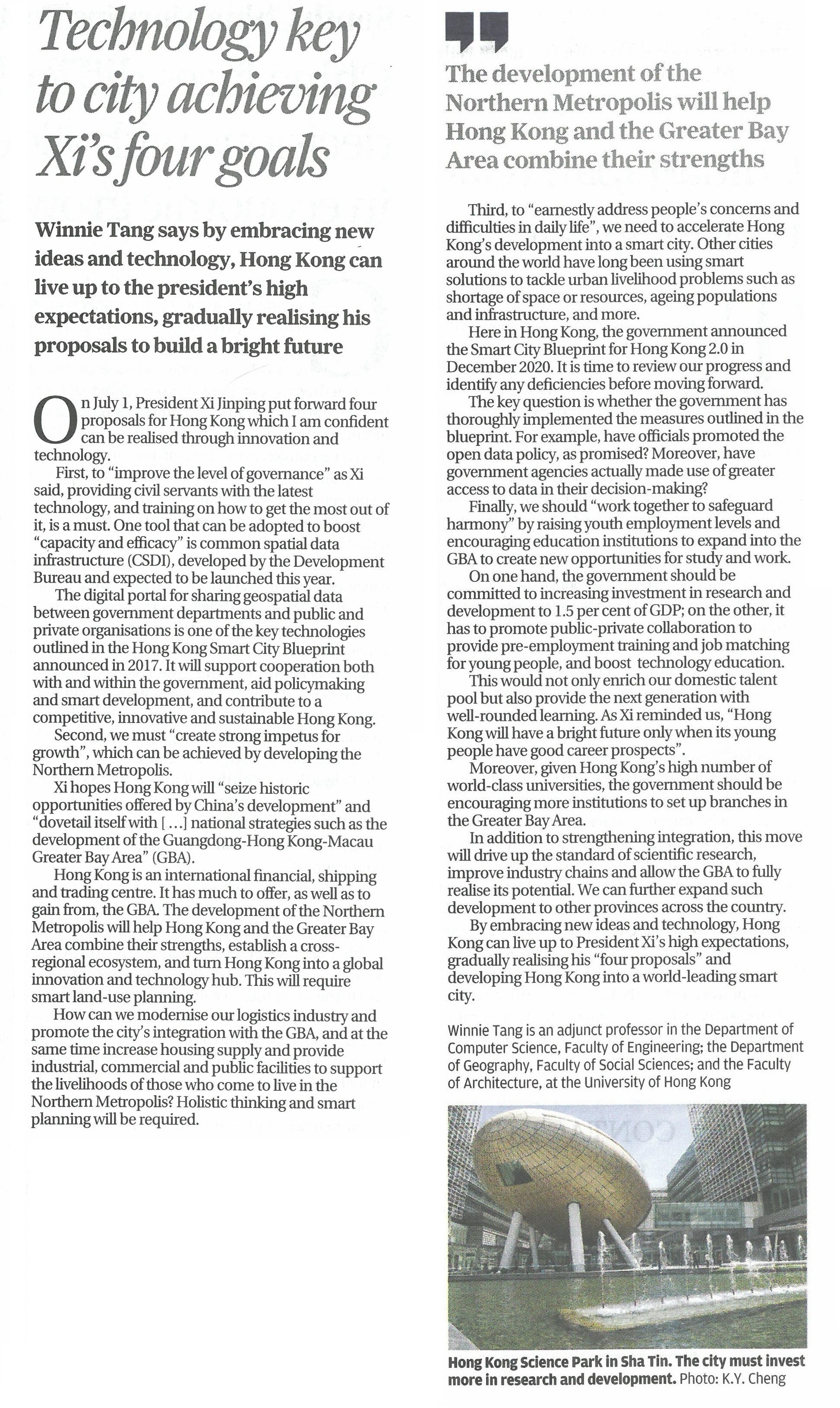網上版請按此

Technology key to city achieving Xi's four goals
Winnie Tang says by embracing new ideas and technology, Hong Kong can live up to the president's high expectations, gradually realising his proposals to build a bright future
On July 1, President Xi Jinping put forward four proposals for Hong Kong which I am confident can be realised through innovation and technology. First, to "improve the level of governance" as Xi said, providing civil servants with the latest technology, and training on how to get the most out of it, is a must. One tool that can be adopted to boost "capacity and efficacy" is common spatial data infrastructure (CSDI), developed by the Development Bureau and expected to be launched this year.
The digital portal for sharing geospatial data between government departments and public and private organisations is one of the key technologies outlined in the Hong Kong Smart City Blueprint announced in 2017. It will support cooperation both with and within the government, aid policymaking and smart development, and contribute to a competitive, innovative and sustainable Hong Kong.
Second, we must "create strong impetus for growth", which can be achieved by developing the Northern Metropolis.
Xi hopes Hong Kong will "seize historic opportunities offered by China's development" and "dovetail itself with [ …] national strategies such as the development of the Guangdong-Hong Kong-Macau Greater Bay Area" (GBA).
Hong Kong is an international financial, shipping and trading centre. It has much to offer, as well as to gain from, the GBA. The development of the Northern Metropolis will help Hong Kong and the Greater Bay Area combine their strengths, establish a crossregional ecosystem, and turn Hong Kong into a global innovation and technology hub. This will require smart land-use planning.
How can we modernise our logistics industry and promote the city's integration with the GBA, and at the same time increase housing supply and provide industrial, commercial and public facilities to support the livelihoods of those who come to live in the Northern Metropolis? Holistic thinking and smart planning will be required.
Third, to "earnestly address people's concerns and difficulties in daily life', we need to accelerate Hong Kong's development into a smart city. Other cities around the world have long been using smart solutions to tackle urban livelihood problems such as shortage of space or resources, ageing populations and infrastructure, and more.
Here in Hong Kong, the government announced the Smart City Blueprint for Hong Kong 2.0 in December 2020. It is time to review our progress and identify any deficiencies before moving forward.
The key question is whether the government has thoroughly implemented the measures outlined in the blueprint. For example, have officials promoted the open data policy, as promised? Moreover, have government agencies actually made use of greater access to data in their decision-making?
Finally, we should "work together to safeguard harmony" by raising youth employment levels and encouraging education institutions to expand into the GBA to create new opportunities for study and work.
On one hand, the government should be committed to increasing investment in research and development to 1.5 per cent of GDP; on the other, it has to promote public-private collaboration to provide pre-employment training and job matching for young people, and boost technology education.
This would not only enrich our domestic talent pool but also provide the next generation with well-rounded learning. As Xi reminded us, "Hong Kong will have a bright future only when its young people have good career prospects".
Moreover, given Hong Kong's high number of world-class universities, the government should be encouraging more institutions to set up branches in the Greater Bay Area.
In addition to strengthening integration, this move will drive up the standard of scientific research, improve industry chains and allow the GBA to fully realise its potential. We can further expand such development to other provinces across the country.
By embracing new ideas and technology, Hong Kong can live up to President Xi's high expectations, gradually realising his "four proposals" and developing Hong Kong into a world-leading smart city.
Dr. Winnie Tang
Adjunct Professor, Department of Computer Science, Faculty of Engineering; Department of Geography, Faculty of Social Sciences; and Faculty of Architecture, The University of Hong Kong